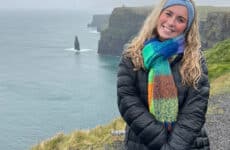By Stephanie Menders | Managing Editor
Disclaimer: People who are quoted in this article were interviewed between February 3 and February 6. Please note that their sentiments reflect the state of the executive order at the time of their interview.
“My family members, who survived the genocide, survived by escaping to different countries,” said Mary Chakerian. A senior marketing major with a minor in business administration, Chakerian is currently enrolled in the five-year program working towards her M.B.A. Her great grandparents were able to flee to Iran, Iraq, and Greece, respectively, during the Armenian Genocide, which resulted in the systematic extermination of over 1.5 million citizens between 1915 and 1917.
Chakerian’s family arrived in the U.S. in the late 1970s, when her parents were teenagers. “They were detained at the JFK airport,” said Chakerian. “There was actually a newspaper clipping in the New York Times about my family, which is pretty similar to what’s happening right now.”
On Friday, January 27th, newly inaugurated President Donald J. Trump signed an executive order banning entry into America from seven different countries (Iran, Iraq, Libya, Somalia, Sudan, Syria, and Yemen) for 90 days. The order also decreased the total number of refugees to be accepted in 2017 from 110,000 to 50,000. The ban was blocked by a restraining order filed on February 3rd by Judge James Robart from Washington state. Most recently, the Federal Appeals court voted 3 to 0 against reinstating the ban. Generally, those who support the order say it is a matter of national security, and those who oppose it argue that it is xenophobic and, more specifically, Islamophobic.
For students like Chakerian, this order feels personal. “It’s painful,” said Chakerian. “My father came to this country as a political refugee from Iraq.” Senior Courtney Schramm also referred to the executive order as “painful”.
Schramm, a social work major with a minor in psychology, is currently interning at Dorcas International Institute of Rhode Island, a non-profit that works to resettle refugees in the area. She has been interning at the Providence-based agency since September and will continue there until the beginning of May. “I was in disbelief,” Schramm said about finding out about the order.
Part of her internship includes helping immigrants and refugees resettle locally. Schramm was supposed to be helping resettle three men from Somalia at the end of January, but now she wonders if she will ever get to meet them. “Their travel had been cancelled,” Schramm said. “I could just imagine them being told ‘no, you can’t come anymore,’ and what that must have felt like.”
Schramm said that an Iraqi family was also supposed to arrive at the end of January, and a Syrian family this week, but that their cases had been cancelled too. “I want to be hopeful,” Schramm said, “but the damage has already been done.”
Dorcas is the larger of two agencies that resettle refugees in the state. Brandon Lozeau, the community relations manager at Dorcas, says that the organization has resettled anywhere between 20 and 30 people per month in the past year. But now, Lozeau says they are waiting to see what happens with the judicial challenge of the executive order.
“[The executive order] is not in effect for the next two weeks, so we are resettling families who were originally cancelled,” he said. “Now they’re back on but only for the next two weeks.”
Lozeau said that since the order was so sudden and not properly thought out by the federal government, dealing with it was a large “pivot” for Dorcas. “We resettle people regularly,” he said. “Some of our clients’ families are being affected. People who have legal permanent residency here and who are leaving the country for one reason or another aren’t able to come back because of the immigration ban.”
“Families are being torn apart,” said Sister Johnelle Luciani. “I think the executive order is not about safety from terrorists, but more about engendering a stereotype of fear in people.” Sister Luciani, professor and chairwoman of the social work department, said it is times like these when people need to stand up for inalienable human rights.
Sister Luciani referenced the founding of the state of Rhode Island as a reminder of our countries origins. She discussed how people came here to escape religious persecution in England, and that Roger Williams left the Massachusetts colony when he was disappointed in the rules that began to emerge there surrounding religion. He left to found Rhode Island, and to guarantee that all people could be free to practice their beliefs. “The country, and our state, was founded on religious freedom and now we’re banning people based on their religion, ” she said. “Sometimes the oppressed become the oppressor.”
Salve Regina University is an institution that was founded by the Sisters of Mercy, and is rooted in the mercy tradition. The mercy mission is something that Chakerian, Schramm, and Sister Luciani (a Sister of Mercy), all have in the forefront of their minds as they discuss this executive order.
“The Sisters of Mercy have defined what we consider to be critical concerns for our time, and one of them is immigration, that we stand in solidarity with people who are seeking a better life,” Sister Luciani said. “People seeking asylum in this country are right holders…and we have a responsibility to ensure that those rights are guaranteed.”
There are three students currently enrolled at Salve who are from Syria. I contacted a student who is here on a student visa from one of the seven nations listed in the executive order, but they declined to comment openly on the order. “I was not advised to talk publicly regarding this issue,” they said, “as it could have a negative impact on my status and safety here.”
I also attempted to contact students who support the president’s executive order. They declined to comment publicly or did not respond to invitations for interviews.
University President Sister Jane Gerety sent an email blast to the Salve community on February 1st, five days after the executive order was signed, in opposition of the ban.
“I rely on our Catholic tradition of welcoming the stranger,” wrote President Gerety. “I rely on my commitment to Salve’s mission statement that describes ours as ‘a community that welcomes people of all beliefs.'”
As for Chakerian, she said she would like to see how Salve will respond to the order in the coming months, specifically wondering if the university will offer opportunities to students who can not go home, or who fear not being able to return to the U.S. afterwards.
“I think immigrants, descendants of immigrants, minorities…all feel more vulnerable now than they did before. They don’t feel protected against policies,” she said. “I come from a line of people having to leave their countries… for their own survival. That’s where the pain comes from, knowing personally how that feels.”














